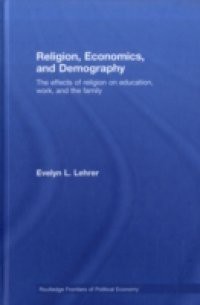Using the tools of economics, this book analyses how religion affects decisions and outcomes in a wide range of areas, including education, employment, family size, entry into cohabitation and formal marriage, the choice of spouse and divorce. In each case, the relationships are rigorously quantified based on multivariate statistical analyses of large scale US data. The results show, for example, that when people marry outside their faith, there is an increase in the probability of divorce, the magnitude of the adverse effect depending in part on the ecumenical/exclusivist nature of the two religions. Other analyses show that youth who grow up with some religion in their lives are less likely than their counterparts with little or no religious involvement to drop out of high school or enter cohabiting arrangements at a young age. Overall, both religious affiliation and the extent of participation in religious activities are found to have far-reaching implications for economic and demographic behaviour. The book contains a wealth of data illustrating how the religious and secular realms of people's lives are intimately intertwined. With its economic perspective, it offers new ways of thinking about these relationships and is a valuable resource for students and scholars interested in the role of religion in education, work and the family.

